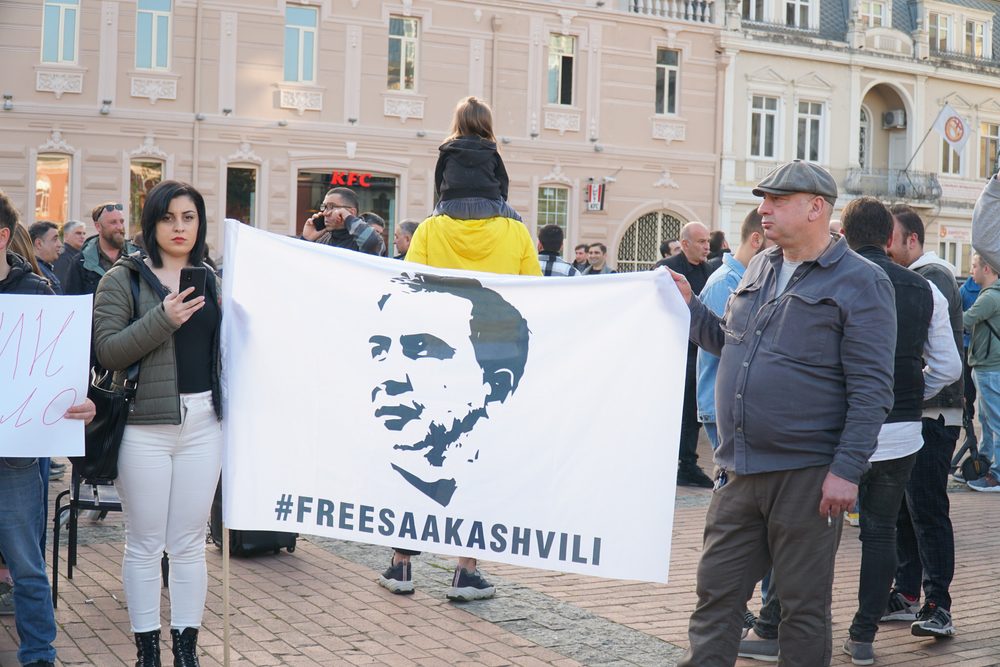
Supporters of Georgia’s ex-president Mikheil Saakashvili
Members of the European Parliament are criticising the current leadership of Georgia, saying the country’s cruel treatment of its ex-president jeopardises its aspirations to attain EU membership.
A Georgian court on Monday, February 6th, rejected former president Mikheil Saakashvili’s appeal for release on medical grounds. Saakashvili called the court proceedings “a joke” and said,
The government’s experts did not even bother to see me once, but the court believed them, and not the international team that included a Nobel Prize winner, that said if I stay in prison I will die … Now I’ve basically got a death sentence.
The imprisonment by Georgian authorities of the former president, who Ukrainian President Volodymyr Zelensky says is being “slowly killed” in prison, was condemned by EU lawmakers during last week’s parliamentary session. Saakashvili is under arrest on charges of corruption, but he claims the charges are politically motivated by rivals in his native Caucasus Republic, principally the ruling Georgian Dream party. This cruel treatment of an ex-statesman puts Georgia’s aspiration to join the EU into serious doubt.
Speaking for the EPP Group, Slovakian MEP Maria Lexman stated that the former president’s treatment may endanger the nation’s application for EU membership. She criticised the current Georgian leadership, saying that the “games, tricks, and lies must stop. This shameful behaviour is in direct contradiction to the [Georgian] government’s stated European aspiration, and the very values and principles entailed.”
Georgia applied for membership in the European Union in March of 2022, alongside Ukraine and Moldova, in response to the Russian invasion. All three applications were considered by the European Council that June. However, concerns about corruption, political polarisation, and the influence of oligarchs on political life meant Georgia was not granted applicant status but was instead given the “European Perspective” status—a kind of candidacy for candidacy.
The likelihood of Georgia meeting the EU’s list of reforms required for candidacy now seems far off. Markéta Gregorová of the Czech Pirate Party seemed to echo this pessimism as she doubted the ultimate sincerity of the Georgian government in its reform efforts:
Although we all appreciate attempts at legislation tackling oligarchization, we also hear varying messages from Georgian authorities regarding which personas in the country will be impacted by legislation.
“Considering that the current government there appears to be as concerned with its oligarchs’ welfare as it is with reform,” Gregorová said it “suggests that the legislation won’t really solve the problem.”
Anna Fotyga, speaking for the conservative ECR Group, compared the treatment of Saakashvili with threats made by Putin during the 2008 war with Russia.
"Several years ago, #Putin personally described the kind of treatment he wanted to impose on Mikheil Saakashvili, then-President of 🇬🇪 Georgia." 🗣 ECR MEP @AnnaFotyga_PE. #EPlenary @SaakashviliM pic.twitter.com/PYEkrnXkDX
— ECR Group (@ecrgroup) February 2, 2023
Georgia is currently governed by the Georgian Dream party, founded by billionaire Bidzina Ivanishvili, who is generally believed to be the puppet master of the government. When the party won the 2020 elections, it sparked enormous unrest in Georgia. The opposition parties claimed the vote had been rigged and refused to enter parliament, while Georgian Dream proceeded to form a government by itself. Only intervention from the EU brought all parties back to the table.
Now, increasing fears that Georgian Dream is bringing the country back into the Kremlin’s orbit are provoking unrest. Last December, the European Council on Foreign Relation concluded that “Oligarch Bidzina Ivanishvili appears to be largely responsible for this dissonance between Georgian foreign policy and public opinion.” It was into this scenario that Saakashvili returned from self-imposed exile to encourage supporters in the local elections of 2021. He was arrested shortly after his return.
